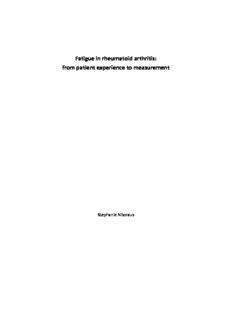
Fatigue in rheumatoid arthritis: from patient experience PDF
Preview Fatigue in rheumatoid arthritis: from patient experience
Fatigue in rheumatoid arthritis: from patient experience to measurement Stephanie Nikolaus Thesis, University of Twente, 2012 ISBN/EAN 9789461082763 © Stephanie Nikolaus Lay-out and printed by Gildeprint Drukkerijen, Enschede, the Netherlands The studies presented in this thesis were performed at the department of Psychology, Health & Technology of the University of Twente (Enschede) and the Arthritis Center Twente at Medisch Spectrum Twente hospital (Enschede) and the hospitals of “Ziekenhuisgroep Twente” (Almelo and Hengelo), the Netherlands. The rheumatology research program of PHT is financially supported by the Dutch Arthritis Foundation (Reumafonds). This project is financially supported by Stichting Reumaonderzoek Twente and the Institute of Behavioural Research. Publication of this thesis was financially supported by the Dutch Arthritis Foundation (Reumafonds). FATIGUE IN RHEUMATOID ARTHRITIS: FROM PATIENT EXPERIENCE TO MEASUREMENT PROEFSCHRIFT ter verkrijging van de graad van doctor aan de Universiteit Twente, op gezag van de rector magnificus, prof.dr. H. Brinksma, volgens besluit van het College voor Promoties in het openbaar te verdedigen op vrijdag 16 maart 2012 om 14.45 uur door Stephanie Nikolaus geboren op 2 november 1980 te Kleef, Duitsland Dit proefschrift is goedgekeurd door de promotor Prof. dr. M.A.F.J. van de Laar en assistent-promotoren Dr. C. Bode en Dr. E. Taal. Samenstelling promotiecommissie: Promotor: Prof. dr. M.A.F.J. van de Laar Assistent-promotoren: Dr. C. Bode Dr. E. Taal Leden: Prof. dr. E.T. Bohlmeijer (University of Twente) Prof. dr. J. Dekker (Free University Amsterdam) Prof. dr. R. Geenen (University Utrecht) Prof. dr. C.A.W. Glas (University of Twente) Prof. dr. S. Hewlett (University of West England, Bristol UK) Prof. dr. P.L.C.M. van Riel (Radboud University, Nijmegen) Contents Chapter 1 General introduction 9 Chapter 2 Fatigue and factors related to fatigue in rheumatoid arthritis: a systematic review 21 Chapter 3 Measuring fatigue in rheumatoid arthritis 69 Chapter 4 New insights into the experience of fatigue among patients with rheumatoid arthritis: a qualitative study 75 Chapter 5 Four different patterns of fatigue in rheumatoid arthritis patients: results of a Q-sort study 89 Chapter 6 Selection of items for a computer-adaptive test to measure fatigue in patients with rheumatoid arthritis: a Delphi approach 115 Chapter 7 Which dimensions of fatigue should be measured in patients with rheumatoid arthritis? A Delphi study 137 Chapter 8 Expert’s evaluations of fatigue questionnaires used in rheumatoid arthritis – A Delphi study among patients, nurses and rheumatologists in the Netherlands 149 Chapter 9 Calibration of a multidimensional item bank to measure fatigue in rheumatoid arthritis patients 163 Chapter 10 Summary and general discussion 197 Summary in Dutch (Samenvatting) 207 Acknowledgements (Dankwoord) 215 Curriculum vitae 219 List of publications 221 Chapter 1 General introduction 9 When you enter the term “human fatigue” into Google approximately 131.000.000 hits emerge within 0.17 seconds. This enormous amount of information indicates that fatigue is a topic that has considerable relevance for people. Basically, being tired is nothing to worry about. Everybody knows it as signal that body and mind need sleep or relaxation for recovery. Usually fatigue diminishes after taking adequate rest, body and mind are refreshed again. The Oxford dictionary defines fatigue as “a feeling of being extremely tired, usually because of hard work or exercise”.1 However, for most persons with a chronic somatic condition such as rheumatoid arthritis (RA), the situation is different. Aim of this thesis was to explore how fatigue is experienced in patients with RA as only very little is known about this phenomenon. Furthermore it was investigated how fatigue in RA can be measured adequately. The topic is thus twofold; meaning and measurement of fatigue in RA. Rheumatoid arthritis and the experience of fatigue RA is a chronic auto-immune disease that is characterized by inflammation of the joints.2 Typical symptoms are pain, tender and swollen joints, stiffness, functional limitations and fatigue. Between 40% and 80% of the patients report substantial fatigue.3-8 In fact, they mention fatigue as one of their most bothersome problems with RA.9 Patients describe their fatigue as annoying, multidimensional symptom with far-reaching consequences for daily life.10-13 It is different from usual fatigue or tiredness because it is more extreme and no longer earned what makes it unpredictable. Thus general descriptions and lay knowledge do not reflect the experience of patients with RA. Consequently, a different definition of fatigue is needed than for healthy people. However, an internationally accepted definition of fatigue in RA does not exist.14 We do not yet know for sure whether there are differences between RA fatigue and fatigue in other somatic diseases. According to Hewlett there are similar multidimensional components and consequences of fatigue but the diseases differ significantly with regard to the attribution and interpretation of fatigue.11 In cancer for example, fatigue is attributed to chemotherapy and therefore can be predicted and prepared for.15 In MS, fatigue is perceived as exacerbating existing symptoms, whereas in RA existing symptoms are perceived to exacerbate fatigue.16 Based on these differences we might conclude that a definition of fatigue in RA seems necessary and useful. A definition without referring to previous activity is provided by Dittner et al.17 They state that fatigue is an essentially subjective experience that can be described as “extreme and persistent tiredness, weakness or exhaustion—mental, physical or both”.17 In our 10
Description: